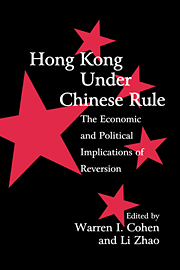Book contents
- Frontmatter
- Contents
- List of Contributors
- Introduction
- 1 Hong Kong as an International Commercial Center
- 2 Cooking the Rice without Cooking the Goose: The Rule of Law, the Battle over Business, and the Quest for Prosperity in Hong Kong after 1997
- 3 Hong Kong Faces 1997: Legal and Constitutional Issues
- 4 The Economic and Political Integration of Hong Kong: Implications for Government–Business Relations
- 5 Hong Kong and Greater China: An Economic Perspective
- 6 One Country, Two Currencies: Monetary Relations between Hong Kong and China
- 7 Political Participation in Hong Kong: Trends in the Mid-1990s
- 8 Strategic and Military Implications of Hong Kong Reversion
- 9 Hong Kong and China's Integration into the International Community
- 10 Hong Kong as a Problem in Chinese–American Relations
- 11 Post–July 1997 Challenges
- Index
3 - Hong Kong Faces 1997: Legal and Constitutional Issues
Published online by Cambridge University Press: 22 March 2010
- Frontmatter
- Contents
- List of Contributors
- Introduction
- 1 Hong Kong as an International Commercial Center
- 2 Cooking the Rice without Cooking the Goose: The Rule of Law, the Battle over Business, and the Quest for Prosperity in Hong Kong after 1997
- 3 Hong Kong Faces 1997: Legal and Constitutional Issues
- 4 The Economic and Political Integration of Hong Kong: Implications for Government–Business Relations
- 5 Hong Kong and Greater China: An Economic Perspective
- 6 One Country, Two Currencies: Monetary Relations between Hong Kong and China
- 7 Political Participation in Hong Kong: Trends in the Mid-1990s
- 8 Strategic and Military Implications of Hong Kong Reversion
- 9 Hong Kong and China's Integration into the International Community
- 10 Hong Kong as a Problem in Chinese–American Relations
- 11 Post–July 1997 Challenges
- Index
Summary
INTRODUCTION
The British dependent territory of Hong Kong will become a Special Administrative Region (SAR) of the People's Republic of China (PRC) on July 1, 1997. This transfer of sovereignty, ordained by both historical forces and a more recent international agreement between the United Kingdom and the PRC, will be an epochal event in international legal history. Never before, even during the spate of decolonization during the late 1950s and early 1960s, has a new entity been created with such attention to its legal underpinnings. Beginning with the international agreement determining the basic features of the PRC's resumption of sovereignty, to a “mini-constitution” created to govern Hong Kong, to supplemental undertakings providing substantial details of such bodies as the new Court of Final Appeal – legal arrangements have been critical to every stage of determining Hong Kong's new status as an SAR of the PRC. Intended to guarantee the promised “high degree of autonomy” for Hong Kong after 1997 and to maintain Hong Kong's current polity, economy, society, and culture for at least fifty years after the PRC takeover, these legal instruments will likely be tested repeatedly in the months and years immediately following July 1, 1997.
Since the crackdown by the Chinese government in 1989, imposed after months of demonstrations in and around Tiananmen Square, the international community – as well as many residents of Hong Kong themselves – have become increasingly concerned.
- Type
- Chapter
- Information
- Hong Kong under Chinese RuleThe Economic and Political Implications of Reversion, pp. 71 - 95Publisher: Cambridge University PressPrint publication year: 1997
- 1
- Cited by

